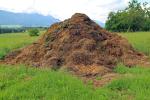FERTCAFE Operational Group: Development of a new sustainable fertilizer through the incorporation of coffee grounds
- Type Operational group
- Status In progress
- Execution 2023 -2026
- Assigned Budget 150.000,00 €
- Scope Autonómico
- Autonomous community Aragón
- Main source of financing CAP 2023-2027
Coffee grounds contain a variety of organic compounds and essential nutrients that can be beneficial for plant growth and development. These include phenolic compounds, humic acids, nitrogen, phosphorus, potassium, and other trace elements important for plant nutrition. Research has shown that coffee-based fertilizers can improve nutrient availability in the soil and promote plant growth. These fertilizers can stimulate microbial activity and improve soil quality by increasing its organic matter content.
Furthermore, it has been observed that the use of these fertilizers can contribute to disease suppression and improve plant resistance to abiotic stress. It also improves the economy and circularity of the coffee production process by generating added value and a new business model.
Coffee grounds contain a variety of organic compounds and essential nutrients that can be beneficial for plant growth and development. These include phenolic compounds, humic acids, nitrogen, phosphorus, potassium, and other trace elements important for plant nutrition. Research has shown that coffee-based fertilizers can improve nutrient availability in the soil and promote plant growth. These fertilizers can stimulate microbial activity and improve soil quality by increasing its organic matter content. Furthermore, the use of these fertilizers has been observed to contribute to disease suppression and improve plant resistance to abiotic stress.
The activities included as tasks in each of the different work packages are detailed below:
- Task 1.1: Evaluating coffee grounds collection potential by location. Reverse logistics testing and techno-economic study
- Task 1.2: Characterization of coffee grounds and design of necessary storage and pretreatment
- Task 1.3: Production of biofertilizer
- Task 1.4: Process life cycle analysis and impacts
- Task 2.1: Field demonstration of application in vineyards
- Task 2.2: Field demonstration of application in dryland arid areas
- Task 2.3: Evaluation of the soil impact of the new biofertilizer in different types of crops
- Task 3.1: Workshops on the impact of the new biofertilizer on the soil
- Task 3.2: Workshops on circular economy solutions for agri-food waste
- Task 3.3: Evaluation of the replication potential in other municipalities/regions of Aragon for field application of the biofertilizer
- Task 4.1: Project days and participation in events (news, radio, TV)
- Task 4.2: Dissemination in the region Task 4.3: Digital media and social networks
- Task 4.4: Generate materials (good practice brochures, news, etc.)
Valorizing coffee grounds brings with it a series of benefits associated with their potential as fertilizer. This project aims to reduce dependence on fossil-based fertilizers in favor of these new biofertilizers. Therefore, the amount of biofertilizer needed per hectare of agricultural land has been identified. Furthermore, it also represents an improvement in the economy and circularity of the coffee production process by generating added value and a new business model. Soil degradation is a global problem that affects the productivity and sustainability of agricultural systems. Intensive exploitation, excessive use of chemical fertilizers, and soil erosion have led to the loss of essential nutrients, a decrease in organic matter, and soil compaction. This reduces the water and nutrient retention capacity, limiting healthy plant growth and development.
On the other hand, water scarcity is a major challenge in agriculture, especially in arid and semi-arid regions. Limited water availability makes plant cultivation difficult and reduces agricultural productivity. In this regard, soil moisture retention is crucial to ensure an adequate supply of water to plants and minimize the need for irrigation. New fertilizers developed to address these issues seek to improve soil health by enriching it with essential nutrients and increasing its organic matter content. This encourages microbial activity and improves soil structure, promoting greater moisture and nutrient retention.
In this regard, the development of fertilizers from coffee has sparked growing interest in the scientific and agricultural communities in recent years. Although still considered an emerging field of study, significant progress has been made in the understanding and application of fertilizers derived from coffee grounds.
The main objective of this project focuses on developing a new biofertilizer based on coffee grounds, creating a new example of the circular economy and contributing to improving soil quality, the profitability and sustainability of farms, and reducing the carbon footprint of other economic activities through the reuse of one of its waste products. The main innovation focuses on the development of this biofertilizer, as well as its evaluation in terms of its impact on the quality of agronomic ecosystems.
- Coordinator/entity name: CIRCE Technology Centre
- Postal address: Avenida Ranillas 3D 50018 Zaragoza (SPAIN)
- Coordinator/entity email: dmer@fcirce.es; jmarano@fcirce.es
976976859 / 639464145
This operational group has a positive impact on the improvement of agricultural farms by developing a new fertilizer product from a waste product that currently undergoes no recovery and is discarded. This product, in addition to being of biological origin, improves the efficiency of agricultural farms, including those in dryland arid areas, by improving their yield through soil fertility and moisture retention, combating pests through its nematicidal effect, and reducing costs by reducing the amount of fossil fertilizers and pesticides used, whose prices have increased significantly in recent months. This project has a positive impact on the environment in several areas. On the one hand, it reuses a waste product as a raw material for the generation of a new bioproduct, in line with the new waste law. Furthermore, it will avoid the use of chemical fertilizers and pesticides, with its consequent positive environmental impact.
- CIRCE Technology Centre
- DEFEDER ALCOLEA SL (j.monter@defeder.es | j.claver@defeder.es)
- EBOCA VENDING LABS S.A.(raulbenito@eboca.com)
- VIÑAS DEL VERO (jferrer@vinasdelvero.es)
- CIRCE Technology Centre





